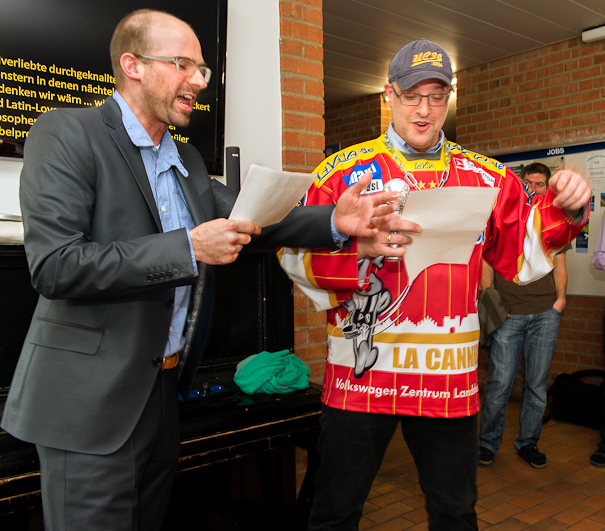Blumentopf at TUM:
Rapper Holunder has a PhD in Physics

TUMstudinews: You are now a TUM graduate, congratulations. For your dissertation, you examined how polymer solutions move through micro-channels. What exactly were you investigating?
BW: I studied the correlation between the macroscopic rheology of polymer solutions and the underlying microscopic dynamics of individual polymers. To this end I developed a micro-viscometer to measure both the shear viscosity and the elongational viscosity of polymer solutions. Concomitantly we monitored the way single polymers behave in the flow – and I developed a theoretical model of the dynamics.
TUMstudinews: You are better known as a member of the hip-hop group Blumentopf than as a physicist. How does a physicist become a rapper? Or: How does a rapper get involved in Physics?
BW: Both of these things somehow found me, quite independently. I became a rapper after starting off with freestyling. We started the band when I was still at school. At that time, I was already fascinated by the natural sciences, especially physics. I just wanted to know how things work. Rap and physics always went side by side.
TUMstudinews: Hip-hop and science – aren’t that two worlds colliding?
BW: Possibly – but collisions may also set free a lot of energy. Both can be mutually enriching.
TUMstudinews: What do your colleagues at the TUM think of your music?
BW: Maybe it would be best to ask them personally – but I think at least some of them are familiar with Blumentopf. Also, the combination of music and physics is not exactly rare at the department. For example, one of my colleagues played the saxophone for Jamaram, another plays bass in the Ska-band "Benuts". And my doctoral supervisor was able to prove his musical talent by demonstrating his phat skills at my PhD ceremony.
TUMstudinews: You "grew up" at the TUM, you studied and graduated here. What makes Munich's Technical University special to you?
BW: Over the years, the Department of Biophysics at E22/E27 has become like a home to me. The atmosphere is great and both my doctoral supervisor Andreas Bausch and also Matthias Rief ensure a productive and creative working environment. Also, our department has traditions: Where else would fresh graduates be carried through the department? I'd like to thank everybody once more for the sedan chair and for the amusing non-official doctoral examination.
TUMstudinews: With research in Celluar Biophysics and being part of a nationally successful music act, your schedule planner must be packed. How do you manage to coordinate both?
BW: I've been wondering too, sometimes. But I just simply didn’t want to have to choose – so I had to make compromises. Within the band, we agreed that I don’t have to take care of so many organizational tasks, so I am able to focus more on the creative parts. Also, I must say that the gross and net timeframes of my studies differ significantly. It took me 5 years to finish my thesis – without the band I guess I could have completed it in 3 or 4 years.
TUMstudinews: Nowadays, a course of studies can be quite challenging – and many find it hard to orientate. What advice would you give young people who are just starting their course of studies? How does one get along?
BW: I guess many of today’s students have a more detailed plan for their life than I had at the time. They tend to start their studies with a more or less clear job aspiration or career goal. It was different for me. I studied Physics purely for interest’s sake. Maybe that’s what I would like to give as an advice for choosing a course of studies: Think of your passions first and don’t become too fixed on a perfect curriculum vitae.
TUMstudinews: What are you planning to do next? Will you continue with scientific work?
BW: Our first Live-DVD will be published in April and we will be touring again. A few festivals will follow in summer – including the Tollwood in Munich. There’s nothing certain in the way of Physics yet. We’ll just have to wait and see…
Bernhard Wunderlich (37) studied Physics at TUM. He earned his doctoral degree at the Chair of Molecular and Cellular Biophysics in Garching. He is a member of the German hip-hop band Blumentopf since the group was founded in 1992. They are known all around Germany for the "Raportagen" in which they commented on matches of the German football team at Worldcups and European Championships for the ARD. The new album "Nieder mit der GbR" was released in September 2012. Blumentopf will be on tour again in April.